

What you should know about wisdom teeth
Wisdom tooth which is also called as the third molar, generally erupt between the ages of 16 and 25.
Most adults have four wisdom teeth, one in each of the four quadrants, but it is possible to have fewer or none, as there is not always enough space in the jaws for the wisdom teeth to grow properly.
If the wisdom tooth has enough room to erupt, that is, not covered by bone and gums, its proper cleaning – similarly to other teeth – is very important.
Our dentists recommend electronic toothbrush over the conventional ones for brushing with the former is more efficient.
If they are not able to emerge normally, wisdom teeth become impacted within the jaw. Our dentists recommend removing wisdom teeth if they don’t fully emerge, in case of infection of soft tissue or damage to nearby teeth. In these cases wisdom teeth removal can be a solution to correct a current problem or to prevent problems that may come up in the future.
Wisdom teeth symptoms that indicate extraction:
- impacted (below the gum line and not erupted)
- emerging at an awkward angle and rubbing against your cheek or tongue
- partially erupted
- all wisdom teeth are breaking through the gum surface at the same time
- damage adjacent, healthy teeth
- development of intense pain/infection
- teeth begin to shift due to crowding in the mouth
It is not necessary for you to get your wisdom teeth removed if they are correctly positioned in your mouth and do not cause any pain or dental problems. Despite that, it is highly recommended to attend regular dental check-ups in order to avoid any unpleasant symptoms and problems.
When do you need to remove your wisdom teeth?
According to dentists and oral surgeons, there are various reasons for wisdom teeth removal:
- Lack of space: Because of the lack of space, wisdom teeth can sometimes emerge at an angle or get stuck, causing the crowding and inflammation of adjacent teeth.
- Wisdom tooth decay: Partially erupted teeth are more prone to tooth decay and gum disease because of their hard-to-reach location.
- Inflammation of surrounding gum tissues: Partially erupted wisdom teeth can turn into a hotbed for bacteria.
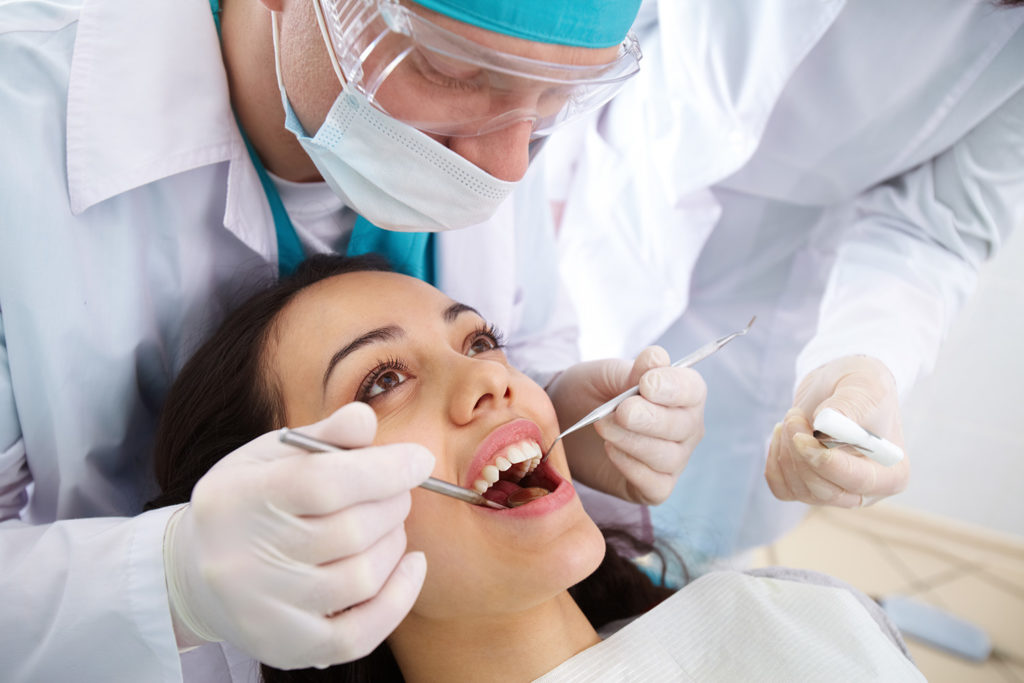

Surgical removal of the wisdom teeth is a routine procedure nowadays. Removing all wisdom teeth at once is recommended when their eruption do not cause any specific problem. In most cases, our surgeons at the Implantcenter dentistry perform wisdom teeth extraction in two sessions: first, two on one side, next time two on the other side. The whole procedure takes about 45-90 minutes.
In most cases, wisdom teeth extractions occur without any complications.
Contact us with your questions about wisdom teeth or have them removed by our specialists to avoid possible problems:
Preparing for wisdom tooth removal
- Visit our clinic for a personal consultation: several questions may arise before wisdom tooth extraction which you can discuss with our experienced surgeons.
- Inform your dentist about any medication you take, because the dosage of certain medications may have to be changed before the surgery.
- Take a day off from work or school the day after the surgery, because you will need to take rest.
- Have someone with you who will be accompanying you home after the procedure (you may feel dizzy and tired).


Some useful advice following wisdom teeth extraction
On the day of the surgery
- After the local anaesthetic wears off, eat only lukewarm or cold foods and avoid the consumption of hot meals!
- Avoid alcohol, coffee consumption and physical activity as they increase your blood pressure that may result in further bleeding.
- Do not smoke or use tobacco products, avoid rinsing and do not spit or suck through a straw. This will promote bleeding and may dislodge the blood clot.
- If you experience bleeding, bite down on a sterile piece of gauze for 15 minutes.
- You can decrease swelling by using ice packs on the face.


2-5 days after the surgery:
- Eat soft and mashed foods.
- Avoid dairy products initially, as bacteria from these products may facilitate an infection.
- Avoid physical activities and strenuous exercises.
- Brush the surgical area gently with a tooth brush.
- Rinse your mouth with undiluted mouthwash after meals and during brushing for a minute at least twice a day.
Post-extraction pain, swelling and trismus may intensify in the first few days, especially in the morning hours. These symptoms are normal, after four days the swelling will go down. Please call your dentist immediately if you have prolonged or severe pain, swelling, bleeding, or fever.
THE WISDOM TOOTH EXTRACTION PROCEDURE and other useful information
– What to expect from the first consultation with the oral surgeon?
The first consultation with the surgeon usually takes 30 minutes. After your medical records and personal details have been recorded in the system, a panoramic X-ray is taken, allowing the surgeon to get a clear picture of your dental health. Then you can discuss your problems, wishes and expectation with the dentist, who will give you detailed information about the surgical procedure and answer your questions in order to dispel any concerns you may have. If you would like to have a second consultation before the surgical appointment to ask further questions from the surgeon, you may book another appointment at the clinic.
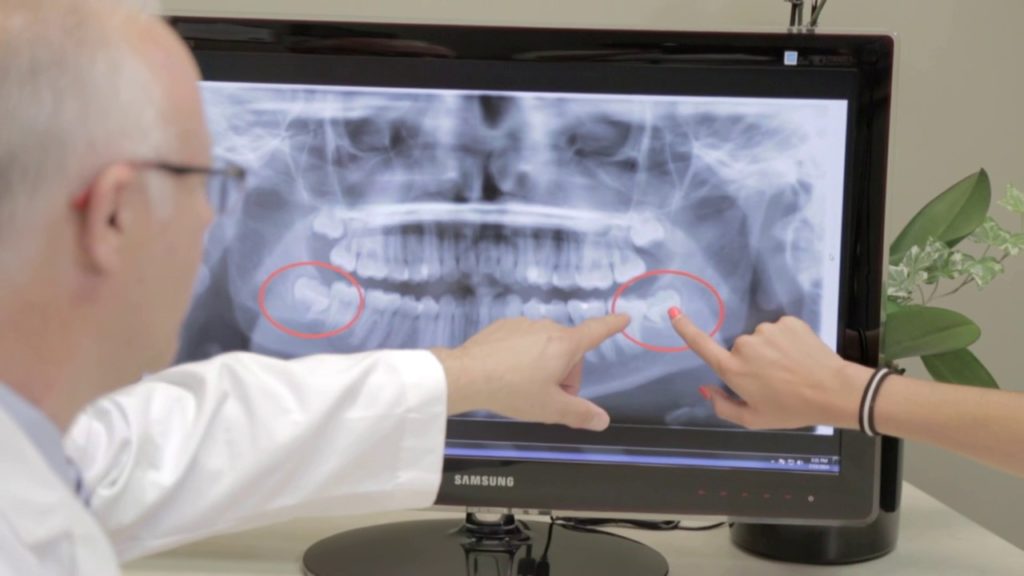

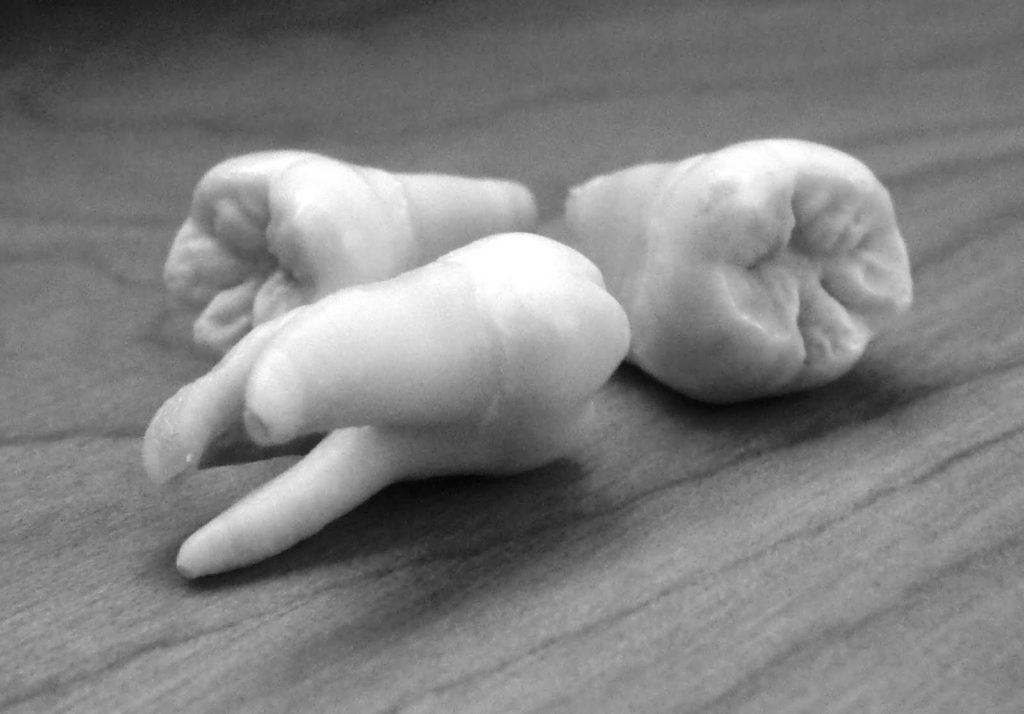

– How long do you have to wait after the consultation to start the treatment?
It depends of the dentist’s or surgeon’s availability, however, at the clinic average waiting time is usually 1-2 weeks. In most cases, wisdom tooth extraction can take place right after the consultation if the patient agrees to undergo the procedure immediately. The procedure usually takes 45-90 minutes. At the Implantcenter there isn’t a long waiting list for wisdom teeth extractions.
– Why does your orthodontist recommend to have your wisdom teeth removed before the installation of your braces?
Your orthodontist may recommend some or all of your wisdom teeth be removed in order to make room for the teeth to be straightened. In other cases, wisdom teeth are removed to prevent the crowding of those teeth that have already been straightened via orthodontic treatment.
– When is it recommended for wisdom teeth extraction to be carried out under general anaesthesia instead of local anaesthesia?
You are free to decide which anaesthetic method you prefer. If you opt for general anaesthesia, you will receive the local anaeshtetic after you have been anaesthetised, so there is no pain during and after the procedure.
Most often, general anaesthesia is recommended when all four wisdom teeth are extracted at once, or the wisdom tooth is impacted and it cannot be removed in one piece.
– How long does the procedure take?
It is difficult to estimate how long the procedure takes. Its length usually depends on such factors as the number of teeth to be extracted and their position in the jaw.
In the most common case, when two wisdom teeth are extracted at once (two on the left or the right side), the procedure may take up to 45-90 minutes.
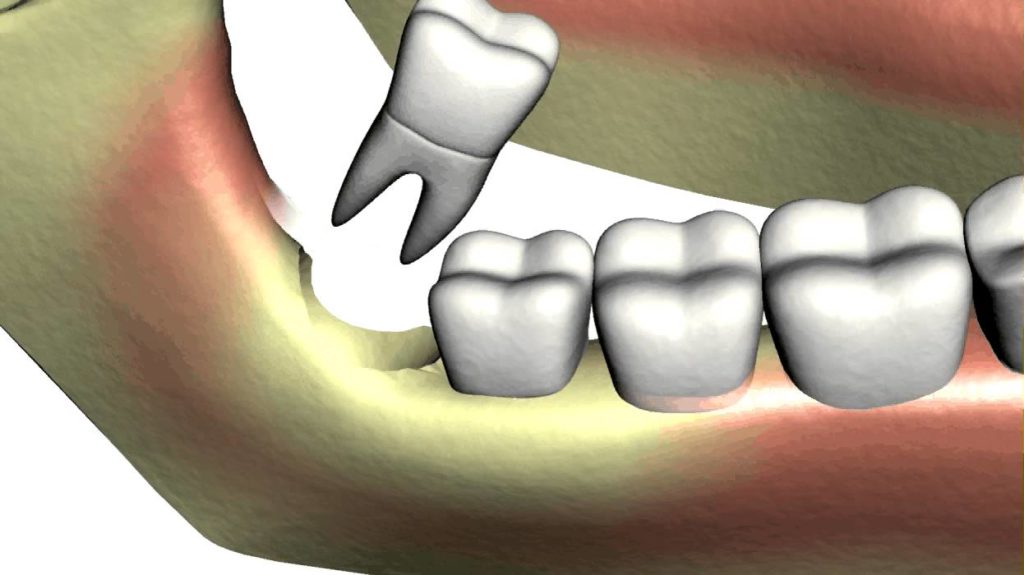

– Is wisdom tooth removal painful?
It is natural that people would rather avoid sitting in the dentist’s chair, especially in the case of tooth extraction. However, our general experience is that, in contrast to the patients’ initial fear the extraction is not an unpleasant experience at all. Moreover, some patients have reported that wisdom tooth extraction is less painful than the anaesthetic injection, which our surgeons make sure to be as gentle as possible.
– Do you have to take antibiotics before the surgery?
There are some cases when patients are advised to take antibiotics before the extraction, in other cases patients are provided with some antibiotics right before their surgery. Most often, antibiotics is prescribed for 5 days following the extraction.
When simple tooth extraction occurs, antibiotics are used just in a few cases.
– Do we use stitches after wisdom tooth extraction?
There are cases when the surgical wound has to be closed with stitches. These stitches are either dissolve or can be removed by the surgeon easily after a week following the surgery, at the time of the control examination.
– What to do if you experience trismus (lockjaw) after wisdom tooth removal?
The most common complication after wisdom tooth extraction is trismus, or tightness in the jaw muscles. It may feel difficult or painful to open your mouth. This tightness can last several days to one week. Try to stretch and massage the area instead of resting it, it will help loosen up the jaw muscles as quickly as possible.
Have your wisdom tooth removed at our dental and oral surgery clinic, where:
- we will treat you with patient-centered and emphatic attitude
- we will provide you with a professional care in a modern and calm environment
- a high-qualified and experienced dental team will be at your disposal
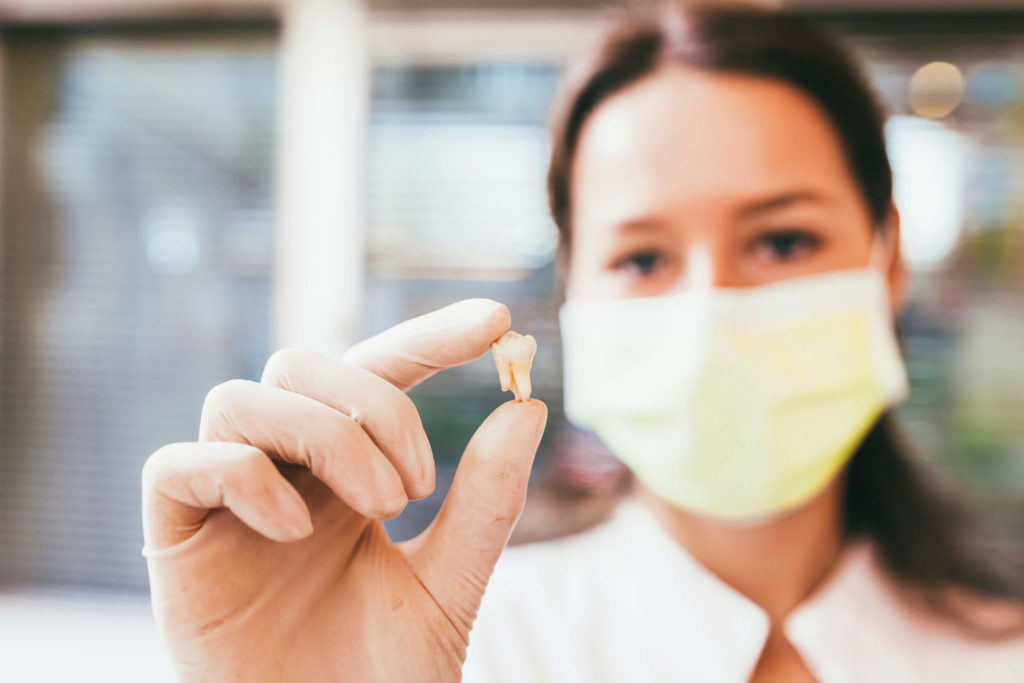

We guarantee that you will receive a personalized treatment. Contact us today:
